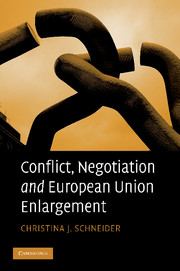Book contents
- Frontmatter
- Contents
- List of Illustrations
- List of Tables
- List of Acronyms
- Acknowledgements
- 1 Introduction
- 2 EU enlargements and transitional periods
- 3 A rationalist puzzle of EU enlargement?
- 4 A theory of discriminatory membership
- 5 EU enlargement, distributional conflicts, and the demand for compensation
- 6 The discriminatory of membership
- 7 Discriminatory membership and intra-union redistribution
- 8 Conclusion
- Bibliography
- Index
3 - A rationalist puzzle of EU enlargement?
Published online by Cambridge University Press: 17 July 2009
- Frontmatter
- Contents
- List of Illustrations
- List of Tables
- List of Acronyms
- Acknowledgements
- 1 Introduction
- 2 EU enlargements and transitional periods
- 3 A rationalist puzzle of EU enlargement?
- 4 A theory of discriminatory membership
- 5 EU enlargement, distributional conflicts, and the demand for compensation
- 6 The discriminatory of membership
- 7 Discriminatory membership and intra-union redistribution
- 8 Conclusion
- Bibliography
- Index
Summary
Scholars who study European Union (EU) enlargement typically assume that for reasons of Pareto-efficiency only three outcomes are possible: countries either acquire full membership rights, get rejected, or stay out of the Union (e.g., Baldwin et al., 1997, Moravcsik and Vachudova 2003, Schimmelfennig 2001). Whereas this assumption was relatively unproblematic for explaining the two Northern enlargement rounds, scholars had to work hard to explain the Mediterranean enlargements in the 1980s, and were baffled by the successful conclusion of the 2004 Eastern enlargement (Schimmelfennig 2001, 2003). The puzzlement grew even more acute with the latest expansion when Bulgaria and Romania joined the Union in January 2007 even though the anticipated costs of admission by far outweighed the gains for several EU members. The failure of extant theories to account for these outcomes spurred scholars into looking for alternative explanations. In his seminal work, Schimmelfennig (2001, 2003) concludes that rational choice approaches cannot offer a satisfactory solution to the puzzle of enlargement. In their place, he proposes an explanation based on the concept of “rhetorical action.” According to his theory, the losers of enlargement could not oppose openly the admission of the remaining European states because of normative considerations.
My rationalist explanation of EU enlargement builds upon some of these insights but extends the existing theories to offer a more general framework for analyzing the phenomenon.
- Type
- Chapter
- Information
- Conflict, Negotiation and European Union Enlargement , pp. 33 - 54Publisher: Cambridge University PressPrint publication year: 2008
- 1
- Cited by

